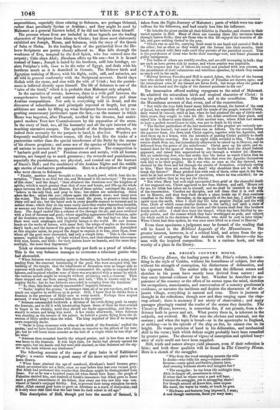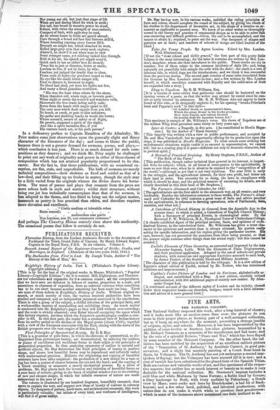MR. PRIOR'S COUNTRY HOUSE.
The Country House, the leading poem of Mr. Prior's volume, is some- thing in the style of Crabbe, without his homeliness of subject, but also without his strength of conception, his distinctness of delineation, and his vigorous finish. The author tells us that the different scenes and sketches in his poem have mostly been derived from nature : and they carry internal evidence of the fact. Whether he describes the ap- pearance of the country or the effect of its scenes upon the mind, sketches the occupations, amusements, and, conversation of a country gentleman's residence, or narrates the incidents and depicts the characters of the ad- jacent village, everything is natural and true. There is justness of thought in the reflections, though now and then verging upon the clap- trap school; there is accuracy if not nicety of observation ; and many passages pleasingly remind the reader of the scenes they describe. The Country House, however, is somewhat flat, if not prosaic, from a de- ficiency both in power and art. What poetry there is, is inherent in the subjects, not evolved. Mr. Prior sees the obvious and external, not the essence ; and when the topic is broad—as in the apostrophe to England, or striking—as in the episode of the ship on fire, he cannot rise to its height. He wants precision of hand in his delineation, and mechanical skill in his verse ; both which defects might probably have been remedied by greater pains. The absence of vigour of conception and spirited buoy- ancy of style could not have been supplied. Still, truth and nature always yield pleasure, even if their reflection is faint; and both these qualities will be found in The Country House. Here is a sketch of the smuggler.
" Who from the wood emerging mounts the stile
In doubt—who trills his song—retires awhile- Returns—casts quick and furtive glances here, And seeming boldness shows mid mingled fear? " The smuggler: he too loves the midnight time, Akin in danger oft, sometimes in crime; If crime that be where most a part will bear, Censure the smuggler, yet in smuggling share ! For though around all know him, none expose His name, the wares he vends, or track he goes.
"His frame and features long impress'd, I scan; A cool though venturous, fierce yet wary man; Nor young nor old, but just that stage of life When art and daring blend for trick or strife; Not tall, but broad in massive power he stood, Robust, with twice the strength of man endued; Compact of limb, with agile step he trod, As he whose hours in fields are pass'd abroad; Care through a broad red face had farrows drilfd, Where brooding cunning every furrow fill'd. Beneath an ample bat, which slouched he wore, Rolled large grey eyes that every nook explore; Alann'd, he show'd it not when near to view Some stranger came, yet sidelong looked him through. Bold in his air, his speech yet supple seem'd, Quick each to use as either best he deem'd; 'Tema his to jest or threaten, frown or smile; Lawless to live, if not by force, by wile; Fearless, yet judged the deadly fray to shun, Prone most to fight—by prudence urged to run; No eye like his could latent danger tell, First to discern it, foremost to repel; No blood had shed, yet were his fights not few, And many a fiscal guardian overthrew.
"His was the hour when others fly the shore, When thunders roll, winds rage, or torrents pour; When night or storm the watch'd and watchers veils, Shoreward the free-trade lading safely sails; Borne from the beach with magic speed to fill The cave near which flash signals from you hill.
No beach, or creek, or gate to him unknown,
By-paths and darkling tracks in woods his home; Where screen'd, secure of safety or of flight, He prowls, supposed a spirit of the night; And like a spirit harmless flits, if you His venture touch not, or his path pursue."
In a dedicatory preface to Captain Hamilton of the Admiralty, Mr. Prior makes some just observations upon the generally slight and flimsy Character of the literature of the day ; and seems to blame the public, because there is not a greater demand for sermons, poems, and plays,— which conclusion is less just. There is as much demand for such com- positions as they deserve ; and we think Mr. Prior might be challenged to point out any work of originality and power in either of those classes of Composition which has not attained popularity proportioned to its cha- racter. But the fact is, that these publications, with an occasional ex- ception' are flat, stale, and unprofitable. The bulk of sermons are merely technical compositions—their skeleton as fixed and settled as that of a law-deed, and their filling up no fresher in matter, though the style may be a little varied from the originals whence the divine draws his horta- tives. The mass of poems and plays that emanate from the press are mere echoes both in style and matter; whilst their structure, without being one jot less technically commonplace than that of the sermon, is less adapted to the theme, and less fitted to bring out the subject matter, inasmuch as poetryis less practical than ethics, and therefore requires More elevation and excellence.
. . " Certis medium et tolerabile rebus
Recta concedi: . . . . .
. . . . mediocribus ease poetis Non homines, non Di, non concessere colunmw."
And perhaps The Country House scarcely rises above this mediocrity. The occasional poems that follow it certainly do not.



























 Previous page
Previous page